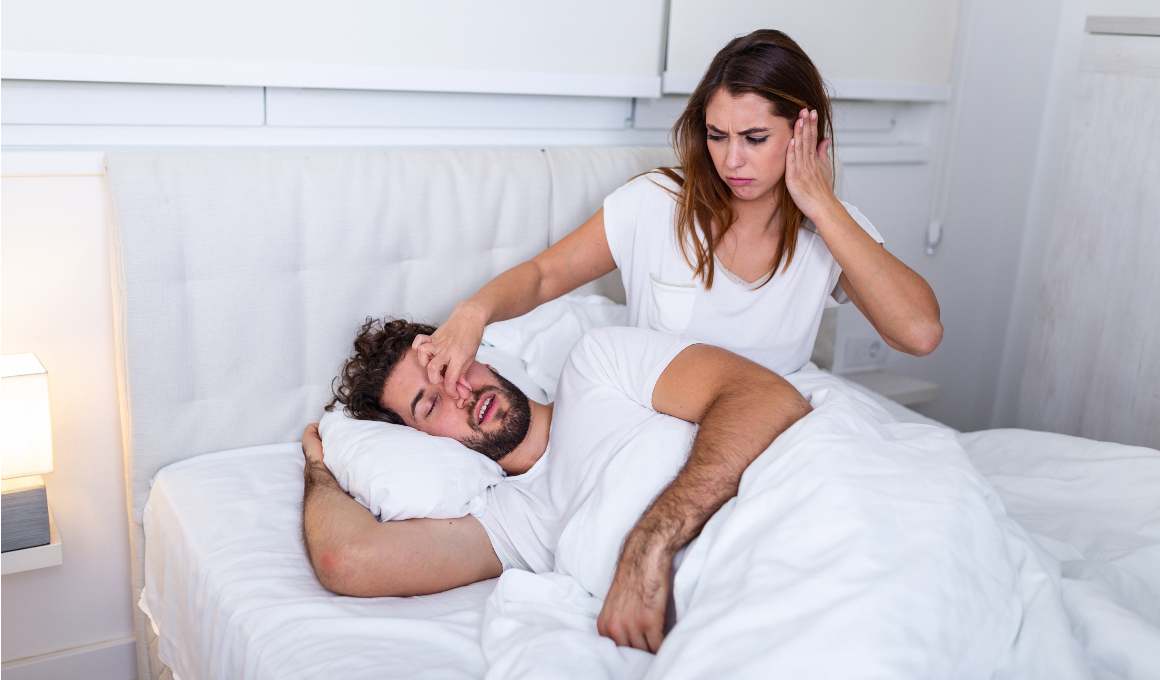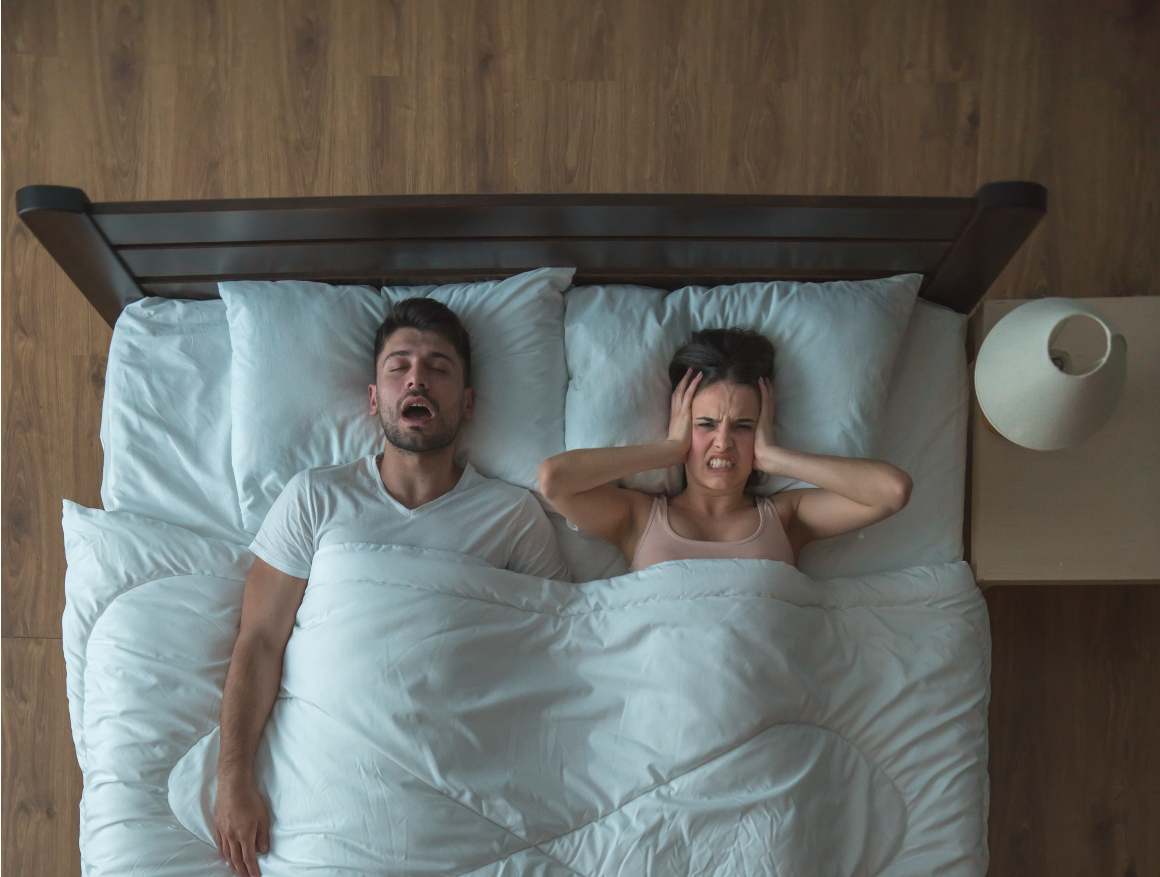Why Do I Snore? Causes, Prevention, and Treatment Options
Published:
Many people ask themselves "why do I snore?" - and this guide aims to answer that question, as well as providing solutions for those looking for relief from this common sleep disturbance. Snoring is a widespread sleep issue experienced by numerous people around the world. In this comprehensive guide, we will delve into the various factors contributing to this nighttime nuisance and provide practical solutions for those seeking relief.
Contents:
- Understanding the Causes of Snoring
- Understanding the Causes of Snoring
- The Role of Sleeping Positions in Snoring
- Identifying Obstructive Sleep Apnea (OSA)
- Treatment Options for Reducing Snoring Severity & Frequency
- Children and Snoring: Recognizing Symptoms & Seeking Help
- Managing Snoring with CPAP Machines & Other Devices
- FAQs in Relation to Why Do I Snore
- Conclusion
First, we'll explore the causes of snoring, such as weight gain, alcohol consumption, and allergies. We'll then discuss how your sleep position can play a significant role in whether or not you snore loudly during the night.
Furthermore, we will highlight lifestyle changes that can help reduce snoring symptoms and improve overall sleep quality. For persistent cases of snoring that may be indicative of more serious conditions like obstructive sleep apnea, medical interventions may be necessary - which we'll also cover in detail.
Last but not least, our discussion will touch upon childhood snoring and its impact on daily life. Finally, we’ll emphasize when it's time to seek medical advice for those asking themselves "why do I snore" to ensure early detection and proper management of any underlying issues.

Understanding the Causes of Snoring
Several factors contribute to snoring, including weight gain, alcohol consumption, allergies, or nasal obstruction caused by colds or sinus infections. Muscle tone throughout your body decreases during sleep, leading to airflow limitation and turbulence in some cases.
Weight Gain and Its Impact on Snoring
Weight gain, particularly around the neck area, can increase the likelihood of snoring as it puts pressure on your airways while you sleep. This added pressure narrows your throat passage, making it more difficult for air to pass through smoothly, which results in vibrations that cause snoring sounds. Losing excess weight may help reduce or even stop snoring.
Alcohol Consumption as a Contributing Factor
Alcohol consumption, especially before bedtime, relaxes muscles within the throat, resulting in partial blockage of airflow leading to increased chances of people who snores occasionally. To prevent this from happening, consider reducing alcohol intake hours before going to bed, ensuring better quality restful night's slumber without disruptive noises associated with heavy breathing patterns.
Allergies and Nasal Obstructions
- Allergies: Allergic reactions can lead to inflammation within nasal passages, restricting proper airflow, thereby increasing the probability of a person snoring loudly due to turbulent movement experienced during the inhalation and exhalation process. Manage symptoms effectively using over-the-counter prescription medications, antihistamines, decongestants, and nasal corticosteroids.
- Nasal obstructions: Conditions such as colds or sinus infections cause a stuffy nose, which obstructs air passage, making it difficult to breathe freely through nostrils, resulting in snoring sounds. Try using saline sprays, humidifiers, and steam inhalation techniques to alleviate congestion and promote smoother, quieter breathing while asleep.
In addition to these factors, sleep posture and muscle tone can also play a role in why people snore. By understanding the root causes of your snoring, you can take steps towards finding an effective solution to improve your sleep quality and ensure a good night's sleep for both you and your bed partner.
Understanding the Causes of Snoring
Several factors contribute to snoring, including weight gain, alcohol consumption, allergies, or nasal obstruction caused by colds or sinus infections. Muscle tone throughout your body decreases during sleep, leading to airflow limitation and turbulence in some cases.
Weight Gain and Its Impact on Snoring
Excess body weight can lead to an increase in fatty tissue around the neck area, which may cause a narrowing of the airways. This results in a higher likelihood of snoring. Losing excess pounds through regular exercise and maintaining a healthy diet can help reduce snoring episodes for many individuals.
Alcohol Consumption as a Contributing Factor
Alcohol consumption, especially before bedtime, relaxes muscles within the throat, making it more likely for them to collapse partially obstructing airflow resulting in increased snores. Reducing alcohol intake, particularly close to bedtime, can improve overall quality, reducing instances of disruptive nighttime noises, and promote better rest for both the affected person and their bed partner alike.
Allergies and Nasal Obstructions
- Allergies: Allergic reactions often cause inflammation and swelling of nasal passages, limiting proper breathing while asleep, exacerbating existing tendencies towards loud and frequent occurrences. Seek medical advice for a management plan addressing allergy symptoms to prevent worsening conditions and maintain a good night's sleep.
- Nasal congestion: Colds, sinus infections, and other respiratory issues lead to a stuffy nose, impeding smooth passage required for quiet and peaceful slumber. Consider using saline sprays or decongestants recommended by healthcare professionals to alleviate discomfort associated with blocked nostrils and encourage more restful nights.

The Role of Sleeping Positions in Snoring
Sleeping position plays a significant role in snoring frequency. People who sleep on their back tend to experience more episodes due to gravity pulling down on all muscles, narrowing the upper respiratory tract. This leads to increased resistance against incoming breath, creating turbulent airflow that vibrates the soft palate and uvula, producing noise recognized as 'snore.' Those sleeping on their side usually have fewer issues with snoring.
Why Back-Sleepers are Prone to Snore More Frequently
Back-sleepers often find themselves dealing with louder, more frequent snores because this position allows for greater relaxation of throat muscles and tongue, which can fall backward, obstructing the airway, causing vibrations and sounds associated with a typical episode. Adjusting one's side or using specially designed pillows can help maintain proper alignment of the head and neck, reducing the likelihood of occurrence.
Side-Sleeping Benefits for Reducing Snores
Side-sleeping positions, particularly the left side, may significantly reduce instances of snoring by keeping the airways open and unobstructed throughout the night. Utilizing body pillows or other positional aids can assist individuals transitioning from habitual back sleeping habits towards healthier alternatives, promoting better overall health and well-being for affected persons and loved ones alike. Don't wait, explore available options today to improve your quality of life.
Identifying Obstructive Sleep Apnea (OSA)
Not everyone who snores suffers from Obstructive Sleep Apnea (OSA); however, it is essential for individuals experiencing regular episodes accompanied by daytime fatigue, irritability, poor concentration, memory problems, mood swings, headaches, high blood pressure, heart disease, stroke risk factors, diabetes, or other health complications to visit a doctor for proper evaluation and management plan. Early detection is key in preventing long-term negative effects associated with untreated and undiagnosed sleep disorders.
Symptoms indicating possible OSA
- Loud snoring: While not all people who snore have OSA, loud and persistent snoring can be an indicator of the condition.
- Pauses in breathing during sleep: If you or your bed partner notice that you stop breathing for brief periods while sleeping followed by gasping or choking sounds when resuming breaths, this could indicate OSA.
- Nocturnal awakenings: Waking up frequently throughout the night due to difficulty breathing may also point towards obstructive sleep apnea.
- Morning headaches: Regularly waking up with headaches can be another symptom of disrupted sleep caused by OSA.
- Fatigue and excessive daytime sleepiness: Feeling tired despite getting enough hours of rest might suggest inadequate quality of sleep resulting from underlying issues like OSA.
If you experience any combination of these symptoms regularly or suspect that you might have obstructive sleep apnea based on them, consult a healthcare professional for proper evaluation and diagnosis.
Importance of seeking medical advice
Neglecting the signs of OSA can have serious repercussions if left unchecked. If left untreated, obstructive sleep apnea may increase your risk for:
- High blood pressure: Repeated episodes of low oxygen levels during sleep can cause an increase in blood pressure which might result in hypertension if not addressed.
- Heart problems: Untreated OSA has been linked to a higher risk of heart attack, stroke, and irregular heartbeat (arrhythmia).
- Type 2 diabetes: Sleep apnea is more common among people with type 2 diabetes; conversely, having untreated OSA increases your chances of developing insulin resistance and type 2 diabetes.
To ensure optimal well-being and quality of life overall, don't hesitate to reach out for help today. Early diagnosis and treatment of sleep disorders such as OSA can help to reduce the risk of developing type 2 diabetes, as well as improving overall health.

Treatment Options for Reducing Snoring Severity & Frequency
Healthcare providers offer a variety of treatments to help reduce the severity and frequency of snoring episodes. These range from noninvasive devices that open nasal passages to surgical procedures designed to remove some vibratory tissues at the back of the throat. In this part, we'll look at how to reduce or put an end to snoring by exploring various treatments and changes in lifestyle.
Noninvasive Devices for Treating Snoring
There are several over-the-counter products available that aim to reduce snoring. Nasal strips work by physically opening up your nostrils, allowing air to flow more freely through your nose and reducing turbulence in your airway. Another option is an oral appliance called a mandibular advancement device (MAD), which helps keep your lower jaw forward during sleep, preventing it from falling back and obstructing airflow.
Surgical Procedures to Address the Issue
In cases where noninvasive methods aren't effective enough, surgical procedures may be recommended. Some common surgeries include laser-assisted uvulopalatoplasty (LAUP) and radiofrequency ablation (RFA). LAUP involves using a laser beam to shorten the uvula - the small piece of tissue hanging down at the back of your throat - while RFA uses heat energy generated by radio waves applied directly onto soft palate tissue causing them to shrink over time. Both techniques aim to reduce snoring.
Lifestyle Changes That Can Help
- Avoiding alcohol: Alcohol consumption relaxes the muscles in your throat, increasing the likelihood of snoring. Reducing or eliminating alcohol intake can help prevent snoring.
- Getting plenty of exercise: Regular physical activity not only promotes overall health but also helps to strengthen the muscles around your airway, reducing the chances of them collapsing during sleep and causing you to snore.
- Managing allergies: Allergies can cause nasal congestion and inflammation that contribute to snoring. Taking steps to manage allergic symptoms - such as using a humidifier or taking antihistamines - may help reduce snoring.
- Losing excess weight: Carrying extra pounds, particularly around your neck area, puts pressure on your airway and increases the risk of obstruction. Losing weight through diet and exercise can improve airflow and decrease snoring episodes.
- Quitting tobacco products: Smoking irritates respiratory tissues leading to swelling and narrowing of passages, thus making it harder to breathe freely while asleep. This often results in louder and more frequent snoring. Quitting will promote better breathing and healthier nights of rest for both yourself and your bed partner alike.
Making these lifestyle changes combined with appropriate medical interventions when necessary should lead to improved sleep quality and fewer disruptions due to annoying nighttime noises. Remember to always consult a healthcare professional before starting any new treatment plan to ensure safety and effectiveness tailored to individual needs and circumstances. Don't wait, take control today and enjoy the good night's rest you deserve.
Children and Snoring: Recognizing Symptoms & Seeking Help
Snoring occurs in children as well, with approximately 1 percent of those who snore having obstructive sleep apnea (OSA). Parents should be vigilant for signs of OSA or other sleep-related issues in their children and take appropriate action to seek professional help. Early intervention and the right plan of action can help to avert any long-term repercussions that could arise from unaddressed or undiscovered conditions.
Identifying Signs of OSA in Children
The symptoms of OSA in children may resemble attention-deficit disorder, making it difficult to identify without proper evaluation. Some common signs that your child might be experiencing OSA include:
- Decreased attention during the day: Children with sleep apnea often struggle to stay focused on tasks due to disrupted sleep patterns.
- Difficulty concentrating: Similar to decreased attention, difficulty concentrating is another sign that your child's quality of sleep may be compromised by snoring or OSA.
- Loud snoring: If you notice that your child snores loudly on a regular basis, this could indicate an underlying issue such as obstructive sleep apnea.
- Mouth breathing while asleep: Breathing through the mouth instead of the nose during sleep can signal airway obstruction caused by enlarged tonsils or adenoids, which are common causes of pediatric OSA.
The Importance of Parental Monitoring
To ensure early detection and intervention for potential sleeping disorders like obstructive sleep apnea, parents should closely monitor their child's sleeping habits. This can include:
- Observing sleep patterns: Pay attention to your child's breathing while they sleep, noting any pauses in breath or gasping for air.
- Maintaining a regular bedtime routine: Establishing and maintaining a consistent bedtime routine will help improve your child's sleep hygiene, which may reduce snoring and promote better overall sleep quality.
- Talking with teachers or caregivers: Communicate with those who interact with your child during the day to see if they notice any signs of fatigue, irritability, or difficulty concentrating that could be linked to poor sleep quality.
If you suspect that your child is experiencing issues related to snoring or obstructive sleep apnea, it is essential to consult a healthcare professional for proper evaluation and management. A pediatrician can assess the severity of the problem and recommend appropriate treatment options such as lifestyle changes, continuous positive airway pressure (CPAP) therapy, dental devices designed specifically for children's mouths, or surgical interventions when necessary. Don't hesitate to seek help today.

Managing Snoring with CPAP Machines & Other Devices
For some patients with obstructive sleep apnea (OSA), surgery and dental devices can be effective in reducing the severity and frequency of snoring. Other treatments include breathing devices like continuous positive airway pressure (CPAP) machines, weight loss programs, quitting smoking, adjusting sleeping positions, and using customized mouthpieces designed to keep the airway open during sleep. These solutions provide relief from disruptive nighttime noises while promoting better overall health and well-being for affected individuals and their loved ones alike. Don't wait; explore available options today to improve your quality of life.
The Role of CPAP Machines in Treating OSA-Related Snores
Continuous Positive Airway Pressure (CPAP) machines are a popular treatment option for those suffering from obstructive sleep apnea. The device works by delivering a constant stream of pressurized air through a mask worn over the nose or mouth during sleep. This steady airflow helps maintain an open airway, preventing the collapse that leads to snoring and interrupted breathing.
- Effectively reduces snoring caused by OSA
- Promotes better sleep quality for both patient and bed partner
- Mitigates risks associated with untreated sleep apnea such as high blood pressure or heart disease
Consult your healthcare provider to decide if a CPAP machine is the best way to manage snoring caused by OSA, as they can assess your individual needs.
Customized Mouthpieces for Keeping Airways Open
In addition to CPAP machines, there are various oral appliances available that can effectively reduce snoring by keeping the airway open during sleep. These customized mouthpieces work by repositioning the lower jaw or tongue, preventing them from blocking airflow.
- Non-invasive alternative to CPAP machines and surgery
- Ideal for mild to moderate snoring cases
- Requires a prescription and fitting by a dentist or orthodontist specializing in sleep medicine
For a tailored solution to your snoring, consult with your healthcare provider about obtaining an oral appliance that is best suited for you.
Making modifications to your lifestyle, e.g., shedding weight, abstaining from alcohol prior to bedtime and keeping good nasal hygiene may help in diminishing snoring episodes. Additionally, adjusting your sleeping position may provide relief; try elevating your head slightly or switching from back-sleeping to side-sleeping positions. Don't hesitate to reach out for professional advice if you suspect that you have OSA or another sleep disorder affecting your well-being - early intervention is key.
FAQs in Relation to Why Do I Snore
How Do I Stop Myself from Snoring?
To stop snoring, try adopting lifestyle changes such as losing weight, avoiding alcohol consumption before bedtime, and treating allergies. Adjust your sleeping position by lying on your side instead of your back. If the problem persists or worsens, consult a medical professional for further evaluation and potential treatment options like continuous positive airway pressure (CPAP) machines or customized mouthpieces.
Is Snoring Ever Healthy?
Snoring is not necessarily an indication of poor health; however, it can be disruptive to sleep quality and may signal underlying issues such as obstructive sleep apnea (OSA). It's essential to monitor the frequency and severity of snores and seek medical advice if necessary.
Is It Normal for a 25-Year-Old to Snore?
Snoring can occur at any age due to various factors like nasal obstructions, weight gain, or alcohol consumption. While occasional mild snoring might be considered normal in some cases, frequent or loud snores should be evaluated by a healthcare professional to rule out potential health concerns.
Is It Normal to Snore Every Night?
Daily snoring could indicate an issue that requires attention. Consistent nightly snores might result from factors like obesity or OSA, which need proper diagnosis and treatment. Consult with a healthcare provider if you experience persistent nightly snores.
Conclusion
Conclusion:
If you're wondering "why do I snore?" there are several factors that could be contributing to your nighttime breathing issues. Weight gain, alcohol consumption, and allergies can all impact the frequency and intensity of snoring. Sleep position also plays a role, with back sleeping being a primary contributor to snoring problems.
Lifestyle changes such as avoiding alcohol before bed, regular exercise for improved muscle tone, and managing allergy symptoms can help reduce snoring symptoms. For persistent snorers, noninvasive devices or surgical interventions may be necessary. It's important to recognize signs of childhood sleep apnea in children and seek medical advice when needed.













